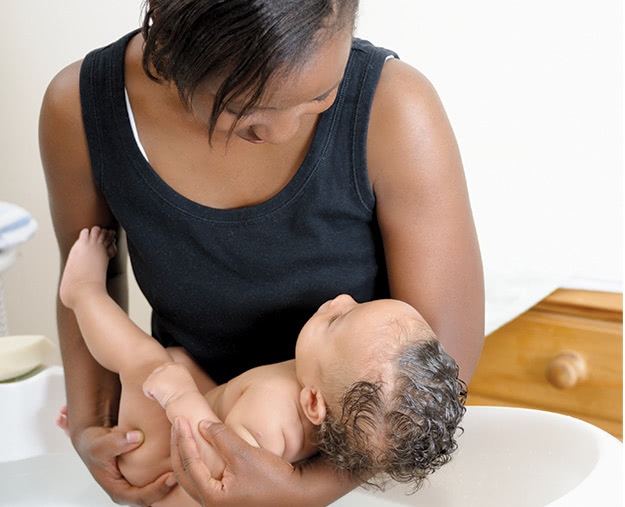
Section
Baby Safety
Babies are naturally curious. Between 6 and 12 months they start to get into everything. Anything they find may go in their mouth. They can also pull chairs over, fall down stairs, and open cabinets and drawers. They can get into danger in a few seconds. Most injuries can be prevented if you watch your baby carefully and childproof your home. Look at every room from your baby’s point of view. Make sure it is safe for your baby to explore and learn.
Where to Find Help
Things You Can Do
In Case of Poisoning
Call Poison Control at 800-222-1222 right away if you think your baby ate, touched, or breathed something harmful.
Call 9-1-1 if your baby is having trouble breathing, is shaking uncontrollably (having a seizure), or is unconscious.
If your baby puts medicine or poison in his mouth, try to get it out.
If poison gets on his skin or in his eyes, rinse it with water.
Never make your baby vomit unless Poison Control tells you to.
Pool and Water Safety
Drowning is a major cause of death in young children.
Never leave your child alone near water.
Make sure pools are fenced on all sides and the gates are locked.
Keep buckets empty and upside down.
Always stay with your baby while you give him a bath.
Checklists
Home Safety Checklist
Use this checklist to make your home ready for your new baby.
Always Watch Your Baby
Do not put your baby in your bed. He could roll out, or you could roll on top of him. The American Academy of Pediatrics recommends that babies sleep
Alone, in a crib or bassinet, in your room.
On their Backs.
In safe Cribs.
Make Sure Your Baby’s Crib Is Safe
Babies and toddlers can choke, fall, or drown very quickly. Injuries are more likely to happen when you are tired or busy.
Make Your Home Safe for Your Baby
When your baby starts to crawl, it is time to childproof your house.
Your baby can choke on anything small enough to fit through a toilet paper roll. Keep jewelry, coins, plastic bags, and other small objects out of reach.
Keep all medicines out of reach and in childproof containers.
Put covers on electric outlets.
Tape electric cords to the floor or wall.
Make sure heaters and vents cannot burn your baby.
Tie up cords from window shades and curtains.
Put safety latches on low cabinets and drawers.
Put gates at the top and bottom of stairs.
Put gates or railings on windows and protective rails on balconies.
Fasten dressers, bookcases, and TVs to walls.
Take Special Care in the Bathroom and Kitchen
Put a childproof knob on the bathroom door.
Always stay with your baby when you give him a bath. A baby can drown in a few inches of water.
When you are cooking, do not hold your baby or let him play near the stove.

Always stay with your baby while you give him a bath.
About Lead Poisoning
Houses built before 1978 can have lead paint. Eating or breathing the chipped paint or paint dust can cause brain damage. Make sure that old paint is covered and does not chip. Make sure pots and dishes are “lead-free.” Talk to your local health department about testing paint and dust from your home for lead.
E-Cigarette Liquid ( “vape juice”) Can Be Deadly
The liquid used to refill e-cigarettes contains nicotine, which is very poisonous. A small amount can seriously harm a child, if it gets in the mouth or on the skin. Make sure to keep it out of your child’s reach. If your child gets it into his mouth or on his skin, call the Poison Control Hotline at 800-222-1222 right away.